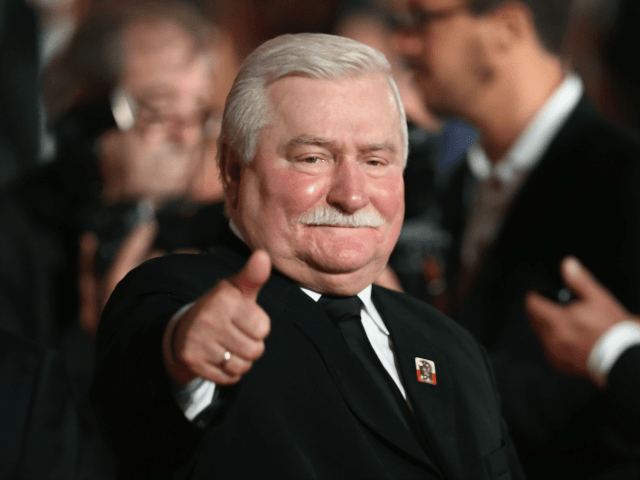Poland’s new right-wing leaders are using fresh allegations about Solidarity hero Lech Walesa to revive conspiracy theories that the communist-era regime staged its own demise in 1989 to hold onto power behind the scenes.
In claims that Polish EU leader Donald Tusk lamented as “unfortunate” for the country’s image abroad, newly-released police files allege that Nobel Peace prize winner Walesa was in fact a paid communist spy.
Walesa is renowned worldwide for negotiating a bloodless end to communism in Poland in 1989. The move triggered the country’s first democratic elections since World War II, ushering Walesa into the presidency a year later.
But right-wing politicians like Jaroslaw Kaczynski, the powerful leader of the governing Law and Justice (PiS) party, have long argued that Walesa was a regime spy and puppet whom communists used as a political fig-leaf while they held on to key military and economic sectors.
Centrists and liberals have repeatedly ridiculed the idea, arguing that Kaczynski — who was also a communist-era dissident — is being vengeful after falling out with Walesa during his presidency.
Kaczynski also insists his late twin president Lech Kaczynski is the true hero of Poland’s historic transition from communism to democracy.
“In light of Walesa’s complete disgrace, Lech Kaczynski will become the symbolic patron of the Solidarity movement,” Kaczynski is quoted as having said in 2010, after his brother died in a jet crash in Russia.
– Walesa a ‘paid communist spy’ –
Poland’s Institute of National Remembrance, which is responsible for prosecuting communist-era crimes, on Thursday revealed a newfound 1970s secret police file showing Walesa was a paid collaborator codenamed “Bolek”.
Walesa admitted Friday he had “made a mistake”, but flatly denied he was ever a regime agent. He was cleared of suspicion by a special vetting court in 2000.
The 72-year-old did not elaborate on what his mistake was, but pointed to a mystery person who “should reveal the truth” about the past.
Poland’s new Foreign Minister Witold Waszczykowski says he is not convinced.
Walesa was a regime “puppet” and the newfound secret police files can prove that “the project to free Poland was orchestrated by the regime,” Waszczykowski told Poland’s commercial TVN 24 news channel on Friday.
“We must try to find out… whether decisions made at the time were independent and in line with national interests or whether they were concocted by foreign or domestic secret services.
“It can show us that we were wrong in thinking we made the revolution and that our decisions were independent,” he added.
– ‘Polish hell’ –
Poland’s TVP public broadcaster, which recently saw the PiS install loyalists in top management, aired interviews with several historians Friday who said the newfound files confirm their convictions that Walesa was indeed a regime collaborator.
During the interviews, TVP also showed communist-era pictures of Solidarity leader Walesa engaging in friendly meetings with regime top brass.
Walesa supporters have hailed his historic role in Poland’s transition to democracy, but admit he could have caved in to secret police pressure while still a young electrician at the Gdansk Shipyard, later the cradle of the Solidarity trade union.
Communist-era dissident Henryk Wujec insists Walesa “never betrayed” fellow anti-regime activists to the secret police.
Grzegorz Schetyna, a former dissident and leader of the liberal Civic Platform (PO) official opposition, said the controversy surrounding Walesa was rooted in political “vengeance” and dubbed it a “real Polish hell”.
“It’s a classic example of how Poles are able to bring out the worst in each other,” he added.
– ‘Unfortunate for Poland’s image –
EU president Tusk, a communist-era dissident and former Polish premier, insisted that Walesa never hid the fact that he was questioned by the regime’s secret police.
“It’s all very unfortunate for Poland’s image, for its great traditions and the legend of Solidarity and Lech Walesa,” he told Polish media on Friday in Brussels.
Poland’s image abroad has already suffered in recent months because of controversial reforms introduced by the right-wing government that critics say undermine the independence of state media and the constitutional court.
In the Gazeta Wyborcza newspaper, editor-in-chief Jaroslaw Kurski traces the history of ill will between Kaczynski and Walesa, which goes back to 1991 after earlier friendlier ties.
“To reduce Lech Walesa, victor over communism, our greatest contemporary historic symbol, to the level of secret agent? No one in the world will understand,” Kurski wrote.
“What are the Poles doing to their own history?”
Walesa himself, on a trip to Venezuela and the United States, defended himself, saying: “On the path I chose, I had to hold all kinds of discussions. And in the end, those discussions led to victory.
“If I had chosen another path, we would have ended up like Ukraine, or even worse,” he told reporters in Caracas, Venezuela, on Thursday.





COMMENTS
Please let us know if you're having issues with commenting.